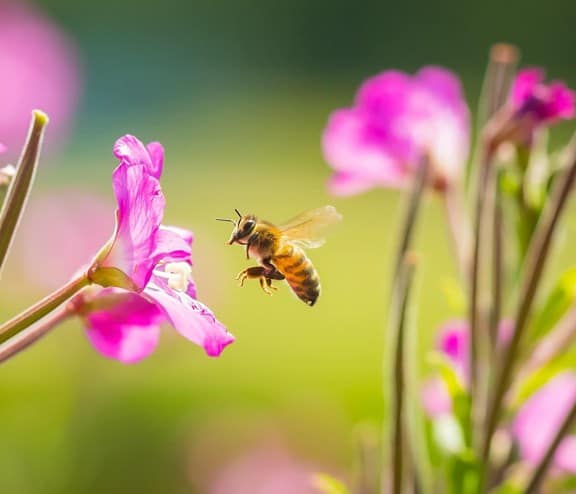
Helping bees to thrive
What is Biffa Bees?
Biffa Bees is a campaign aimed at promoting biodiversity through the planting of wildflower habitats, which have seen a 97% decline in the UK. It’s also a great way of increasing engagement for our colleagues across Biffa as well as a way for our sites to get involved with the local community.
Each year wild insect species pollinate £690 million worth of crops across the UK. As a result for one in every three mouthfuls of food we eat we have our pollinators to thank.
Bees are a key pollinator, however, a third of wild bee and hoverfly species in the UK are in decline with rarer species and solitary bees most at risk of extinction. This decline will only continue with increased use of pesticides and habitat loss.
Over the past 80 years the UK has lost 97% of wildflower habitats, increasing the distance bees must travel to collect pollen, forage, and shelter. By offering a network of ‘bee-lines’ comprised of bee cafes and bee hotels linked across both urban and rural locations we can increase the survival chances for many species.
We first launched our Biffa Bees campaign in 2019 since then we have distributed over 24,000 packets of seeds and 35,000 bulbs to our sites and local community groups. This equates to 4 acres of wildflowers which is the size of 4 football pitches! Fantastic progress was made during the first two Biffa Bees campaign with many great bee-friendly spaces created at Biffa locations and in the wider community, expanding our network of ‘bee-lines’.
We have taken feedback from previous campaigns and will be distributing an additional 14,000 packets of seeds to our sites to share with employees and local community groups in 2023.
Over the past 80 years the UK has lost 97% of wildflower habitats, increasing the distance bees must travel to collect pollen, forage, and shelter. By offering a network of ‘bee-lines’ comprised of bee cafes and bee hotels linked across both urban and rural locations we can increase the survival chances for many species.
We first launched our Biffa Bees campaign in 2019 since then we have distributed over 24,000 packets of seeds and 35,000 bulbs to our sites and local community groups. This equates to 4 acres of wildflowers which is the size of 4 football pitches! Fantastic progress was made during the first two Biffa Bees campaign with many great bee-friendly spaces created at Biffa locations and in the wider community, expanding our network of ‘bee-lines’.
We have taken feedback from previous campaigns and will be distributing an additional 14,000 packets of seeds to our sites to share with employees and local community groups in 2023.
Why is Biffa Bees important?
The populations of pollinators, which include bees, have experienced a steady decline in recent times, so creating dedicated habitats is really important to maintaining and increasing population levels. Without pollinators every one in three mouthfuls of food we eat wouldn’t be available, and almost £700 million of crops wouldn’t get pollinated.How does it link to our Sustainability strategy?
Enhancing biodiversity is an important target under the caring for our people, supporting our communities pillar of our strategy. We have a target of managing 30% of our land holdings for biodiversity by 2030, so raising awareness through campaigns like this is really important.Who do the seed packets go to?
Seed packets will be distributed to our depot locations across the country and handed out to the community. This could include local groups, sports teams schools and anyone interested.When do the seeds need to be planted by?
The seeds should be sown between March and November. Spring and Autumn provide ideal conditions as moisture and warmth are in good supply. If overseeding into grass, it is best to sow during autumn when grass growth has slowed down.How do I plant the seeds?
You can find some useful guides and instructions below.
Any questions on Biffa Bees?
If you have any queries please contact us and we’ll be happy to help. You can also support by spreading the word across social media platforms using the hashtag #biffabees.